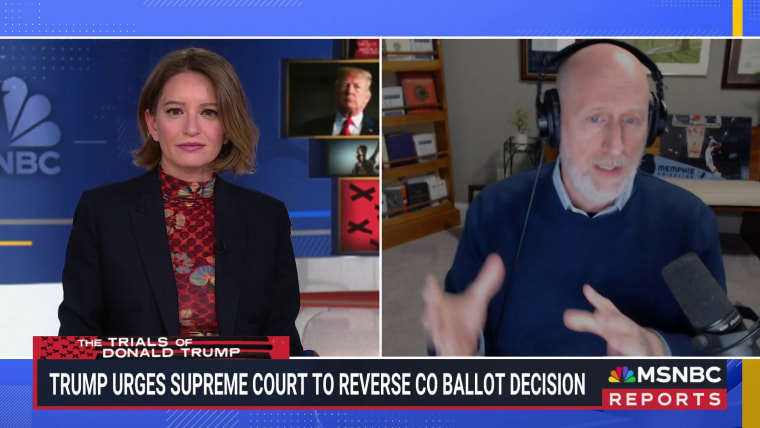In a little under three weeks, the Supreme Court will hear oral arguments on whether former President Donald Trump should be allowed to remain on the ballot in Colorado. His lawyers submitted a brief Friday that’s filled with a rehashed scattershot of arguments as to why he shouldn’t be disqualified under Section 3 of the 14th Amendment. But I direct your attention to an amicus (or friend of the court) brief filed on behalf of nearly 200 Republican members of Congress.
While the GOP lawmakers’ amicus brief is better drafted than most of Trump’s filings, it can’t be ignored that there’s a deeply self-serving element to their arguments. That’s especially true for those members who, under the Colorado Supreme Court’s ruling, could also credibly be described as having “engaged in insurrection” — and thus theoretically be disqualified from holding office.
It’s their inclusion as signatories on the amicus brief that makes this filing particularly odious.
Section 3 states, in part, that if somebody has “previously taken an oath, as a member of Congress, or as an officer of the United States … to support the Constitution of the United States” but then has “engaged in insurrection or rebellion against the same, or given aid or comfort to the enemies thereof,” that person can’t be allowed to “be a Senator or Representative in Congress.” Section 3 also gives Congress the power to, “by a vote of two-thirds of each House, remove such disability.”
The self-interested lawmakers give up the game with this line from the brief: “Although not directly relevant to President Trump, the Colorado Supreme Court would give itself the power to judge the qualifications of those who would be elected to the House or Senate.” That would be especially troubling for Reps. Jim Jordan of Ohio and Paul Gosar and Andy Biggs of Arizona. The three of them were knee-deep in plotting to overturn the election, and, in a more just world, they would have faced expulsion for violating Section 3. It’s their inclusion as signatories on the amicus brief that makes this filing particularly odious.

The GOP lawmakers’ main claim is that the Colorado Supreme Court arrogated power from Congress in its decision, and because Section 5 says that “Congress shall have power to enforce, by appropriate legislation, the provisions of this article,” the 14th Amendment’s provisions aren’t self-enforcing as several top conservative legal scholars have written. They say an 1870 statute that provided a mechanism for blocking former insurrectionists from holding office that was repealed in 1948 is proof Congress changed its mind. (The legislative history of that overhaul of the U.S. Code only includes one word of explanation for why that statute was stripped from the books: “obsolete.”)
Building on that idea, the brief also makes the convoluted argument that because Congress has the power to revoke the disqualification, it’s wrong for the courts to find someone is disqualified in the first place. Congress does have that power, but the problem is that under this scenario, we’ll have run all the way through the primary and general elections before there’s a chance for Congress to act. While totally constitutional and fitting within the revised Electoral Count Act’s auspices, it’s still a very, very tight time frame for Congress to toss out electoral votes on the grounds of his disqualification and would depend on a Democratic-controlled Congress.
Beyond being yet another attempt to normalize Trump’s behavior in trying to throw out the election, these arguments necessarily downplay the attempts by several of the brief’s signatories to do the same.
The members who directly aided Trump’s efforts are especially interested in this case, but the effort to file the brief was led in the House by Majority Leader Steve Scalise, R-La., and in the Senate by Sen. Ted Cruz, R-Texas. Cruz’s participation is worth a side-eye given that he led the charge among Senate Republicans in challenging electoral votes in states where Trump called President-elect Joe Biden’s victory fraudulent. He also pitched a 10-day electoral commission to investigate the nonexistent fraud and potentially give state legislatures time to change their electoral slates as Trump would prefer. He never endorsed Trump’s wildest conspiracy theories, but he was caught on audio hoping Biden’s win would be reversed.
The other signatories to the brief include Senate Minority Leader Mitch McConnell, whose decision in 2021 to vote against conviction in Trump’s second impeachment allowed Trump to run again in the first place. The fact that the Senate acquitted Trump became one of the main planks of Trump’s argument that he’s immune from prosecution. The congressional Republican filing also attempts to frame Trump as a potential canary in the coal mine for courts around the country who might use the Colorado court’s definition of “engaging in insurrection” to toss from the ballot candidates who’ve merely questioned the federal government.
Beyond being yet another attempt to normalize Trump’s behavior in trying to throw out the election, these arguments necessarily downplay the attempts by several of the brief’s signatories to do the same. Jordan, Gosar and Biggs were well aware of what Trump was attempting to achieve, and despite their oaths to support the Constitution, they still backed him. Dozens of other signatories voted against certifying Biden’s win even after the rioters had stormed the Capitol on Jan. 6, 2021. The goal of their brief isn’t just to keep their party’s standard-bearer on the ballot, but it’s also to absolve themselves of their own sins and to inoculate themselves from calls that they, too, face accountability for supporting Trump’s attempt to steal the election.

